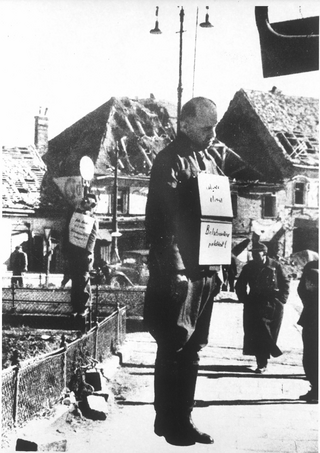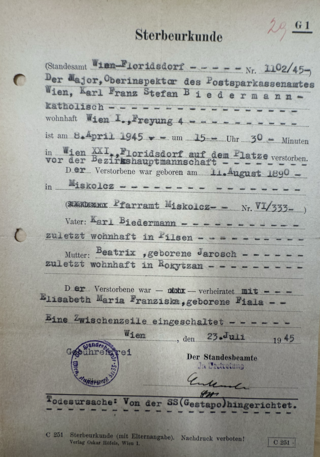Major Karl Franz Biedermann

Personalia
Born:
Died:
Profession:
Persecution:
Imprisoned 05.04.1945 - 08.04.1945,
Murdered on 08.04.1945
Memberships
Curriculum Vitae
Karl Franz Biedermann was born in Miskolc in Hungary, the legitimate son of railroad official Karl Biedermann and Beatrix, née Jarosch. After elementary school, he transferred to the cadet school in Traiskirchen and then became an officer in the Austro-Hungarian army. He took part in the First World War as a front-line officer and served in the Austrian army until 1920. After being discharged as a captain, he joined the Austrian Postal Savings Bank as a civil servant.
After the occupation of Austria by the Third Reich on March 12, 1938, Karl Biedermann joined the German Wehrmacht, was promoted to major in 1940 and took part in the Western Campaign, the Balkan Campaign and the war against the Soviet Union after the outbreak of the Second World War. In 1943, he returned to Vienna, where he was appointed commander of the Greater Vienna Army Patrol Division. By this time, he had already turned his back on National Socialism, especially as he joined the resistance group of Austrians led by Major Carl Szokoll within the Army District Command XVII in Vienna.
In the spring of 1945, this group planned 'Operation Radetzky', the aim of which was to support the Red Army in the liberation of Vienna and thus prevent major destruction. Major Karl Biedermann and his troops were to occupy key positions in the city and prevent bridges from being blown up.
However, the 'Operation Radetzky' planned for April 6, 1945 was betrayed. Major Karl Biedermann was arrested in the night of April 5-6, 1945, tried before a court martial and sentenced to death. On April 8, 1945, he and two other members of the military resistance, Captain Alfred Huth and First Lieutenant Rudolf Raschke

[...] The door of the bus opened and a 60-year-old army officer got out without rank insignia, insignia or decorations. He was wearing breeches, boots and a blouse and had no headgear. His hands were tied in front of him. He had two plaques on his chest and I was later able to read the following: "I made a pact with the Bolshviks!". The officer was led by 2 SS men to the pillar of the bus station where the first stick was attached. The lieutenant shouted: "Up". The 2 executioner's servants lifted him up and the lieutenant pulled his head into the noose. The servants then pulled up on command. This took a few minutes until the officer's tongue emerged. The lieutenant got down, took out a knife or dagger and cut the handcuff. Then he posed complacently and looked around. [...]
Together with the two other murdered resistance fighters Captain Alfred Huth and First Lieutenant Rudolf Raschke, he is laid to rest in a grave of honor in the Hietzing cemetery.
After Austria was liberated by the Allies, his wife Elisabeth Biedermann became involved in the ÖVP-Kameradschaft der politisch Verfolgten und Bekenner für Österreich
Places
Residence:
Honoring:
Memorial:
Citations
Dokumentationsarchiv des österreichischen Widerstands (DÖW)
Österreichisches Staatsarchiv (ÖStA)
Wiener Stadt- und Landesarchiv (WStLA)
Wikipedia unter de.wikipedia.org/wiki/Karl_Biedermann
Matricula Online
Friedhöfe Wien - Verstorbenensuche
